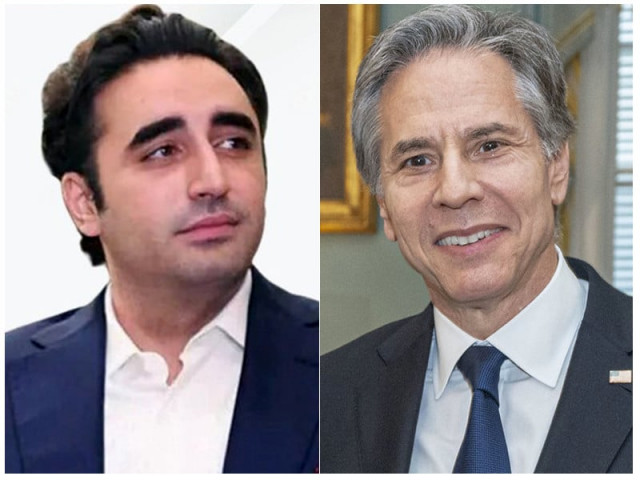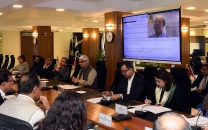'Engagement with mutual respect', Bilawal tells Blinken
Agreed engagement with mutual respect is the way forward, says foreign minister

Foreign Minister Bilawal Bhutto-Zardari sought to strengthen a “mutually beneficial and broad-based” relationship with the United States in a maiden telephone call with his American counterpart Anthony Blinken on Friday.
Using his Twitter handle, Bilawal said he had received the telephone from Secretary Blinken, who felicitated him on his assumption of the Foreign Office.
Received call from @SecBlinken grateful for warm felicitations on my assumption of office. Exchanged views on:
— BilawalBhuttoZardari (@BBhuttoZardari) May 6, 2022
-Strengthening mutually beneficial, broadbased relationship
-Promotion of peace,development & security
-Agreed engagement with mutual respect is the way forward 🇺🇸🤝🇵🇰
Saying he was grateful for “warm felicitations”, the foreign minister said he had exchanged views with the US secretary on “strengthening mutually beneficial and broad-based relationship” with the United States.
Read more: Bilawal struggles to defend dynastic politics during CNN interview
The two foreign ministers also discussed the promotion of peace, development and security. “Agreed engagement with mutual respect is the way forward,” Bilawal added.
This was the first telephonic conversation between the Pakistani foreign minister and the US Secretary of State in nine months. The last time Blinken spoke to Shah Mehmood Qureshi was in August 2021 when the US-led foreign forces were withdrawing from Afghanistan.
Secretary Blinken’s telephone call to the new foreign minister came amid no let-up in former Prime Minister Imran Khan’s allegations that he was ousted from power through a US-backed conspiracy.
The coalition government led by Prime Minister Shehbaz Sharif has decided to form an “independent commission” to look into the allegations but Imran has rejected the proposal and sought a judicial commission on the matter.
Also read: Bilawal rubbishes ‘foreign conspiracy theory’, asks PM to leave 'respectfully'
The controversy revolves around a diplomatic cable the then Pakistani ambassador in Washington sent to the Foreign Office on March 7. The cable was based on Ambassador Asad Majid’s conversation with US Assistant Secretary of State for South and Central Asia Donald Lu.
In that cable, according to Imran, the US official "threatened" Pakistan of dire consequences if the vote of no confidence against the PTI leader did not succeed. The former premier claimed that he was ousted from power because he had pursued an independent foreign policy and undertook a visit to Russia despite the US opposition.
The National Security Committee (NSC), the country’s highest forum on such matters, met twice – first on March 31 when Imran was still the premier and second on April 22 when Shehbaz Sharif was the country’s chief executive. In both meetings, the NSC agreed that the language used by the American official was undiplomatic and tantamount to ‘blatant interference’ but found no evidence to suggest that there was a conspiracy against Imran Khan.
The PTI chairman, nevertheless, has kept building this narrative that the NSC has endorsed his claims. The controversy has complicated the already fraught relationship between Pakistan and the US.
The new government, however, has been trying to bring some semblance of certainty with statements underlining the importance of a relationship with the West particularly with the United States.
The US officials have also issued statements in favour of engagement with Pakistan. The latest telephone call, observers believe, suggests the eagerness from both sides to reset their troubled ties.
Despite the US pullout of Afghanistan, Washington still has stakes in the neighbouring country given that any instability would allow terrorist groups to regroup that may not just pose threat to the region but the US interests too.
Pakistan is worried over the recent spike in cross-border terrorist attacks from Afghanistan and considers counter-terrorism cooperation vital to deny the banned Tehreek-e-Taliban Pakistan (TTP) and other groups space in Afghanistan.



















COMMENTS
Comments are moderated and generally will be posted if they are on-topic and not abusive.
For more information, please see our Comments FAQ